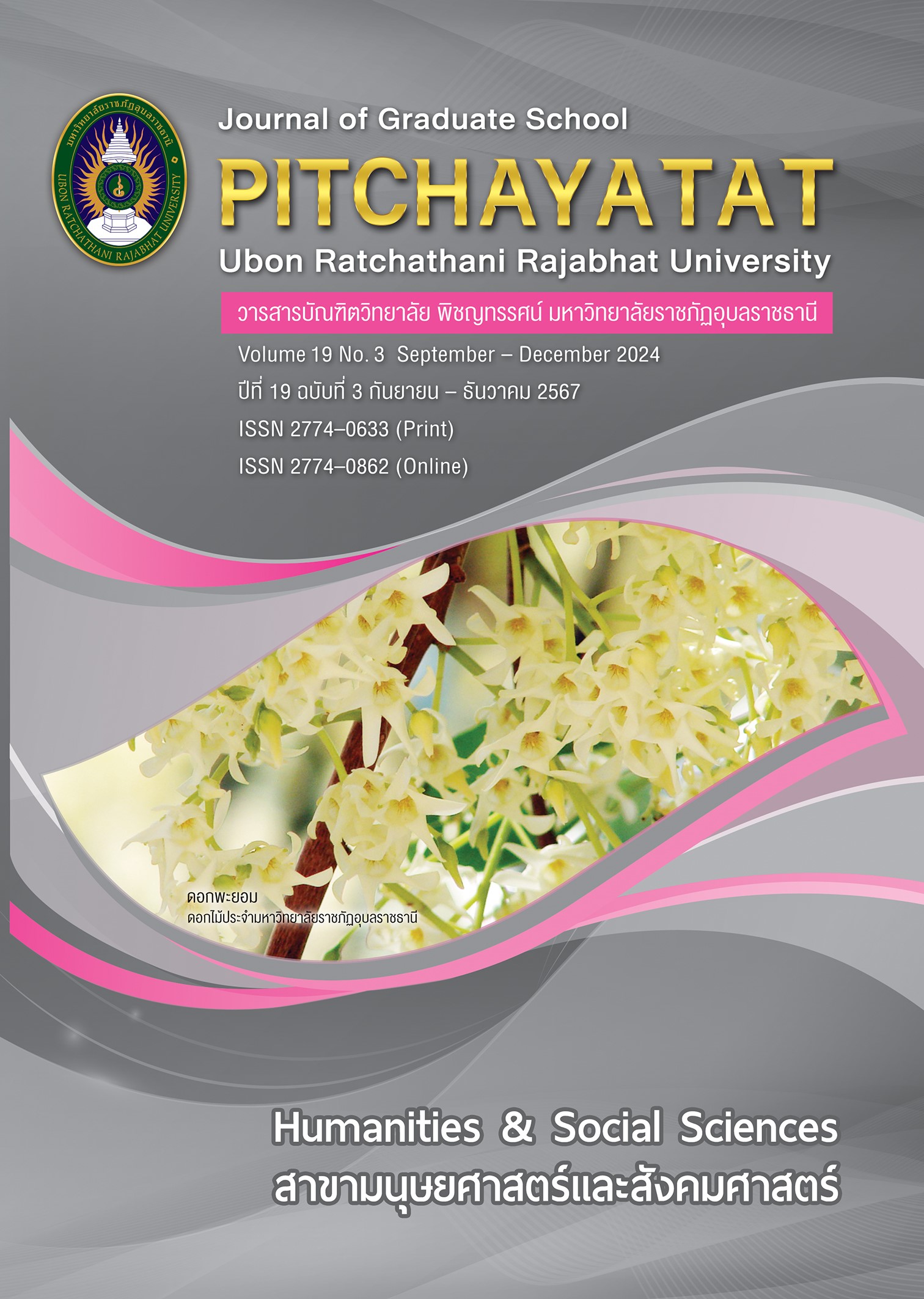การวิจัยเชิงปฏิบัติการกิจกรรมการเรียนรู้กลวิธีอภิปัญญา เสริมด้วยชุดกิจกรรมที่เน้นกระบวนการแก้ปัญหาวิชาคณิตศาสตร์ เรื่อง สมการเชิงเส้นตัวแปรเดียวต่อความสามารถในการแก้ปัญหา ทางคณิตศาสตร์สำหรับนักเรียนชั้นมัธยมศึกษาปีที่ 1
คำสำคัญ:
การวิจัยเชิงปฏิบัติการ, กลวิธีอภิปัญญา, ความสามารถในการแก้ปัญหาทางคณิตศาสตร์บทคัดย่อ
การวิจัยนี้มีวัตถุประสงค์เพื่อ 1) พัฒนากิจกรรมการเรียนรู้กลวิธีอภิปัญญา เสริมด้วยชุดกิจกรรมที่เน้นกระบวนการแก้ปัญหาวิชาคณิตศาสตร์ เรื่อง สมการเชิงเส้นตัวแปรเดียว ของนักเรียนชั้นมัธยมศึกษาปีที่ 1 ด้วยการวิจัยเชิงปฏิบัติการ ให้มีประสิทธิภาพตามเกณฑ์ 75/75 2) ศึกษาความสามารถในการแก้ปัญหาคณิตศาสตร์ ของนักเรียนชั้นมัธยมศึกษาปีที่ 1 ที่ได้รับการจัดกิจกรรมการเรียนรู้กลวิธีอภิปัญญา เสริมด้วยชุดกิจกรรมที่เน้นกระบวนการแก้ปัญหาวิชาคณิตศาสตร์ และ 3) เพื่อเปรียบเทียบผลสัมฤทธิ์ทางการเรียนวิชาคณิตศาสตร์ เรื่องสมการเชิงเส้นตัวแปรเดียว โดยการจัดกิจกรรมการเรียนรู้กลวิธีอภิปัญญา เสริมด้วยชุดกิจกรรมที่เน้นกระบวนการแก้ปัญหาวิชาคณิตศาสตร์ ของนักเรียนชั้นมัธยมศึกษาปีที่ 1 ระหว่างก่อนเรียนกับหลังเรียน โดยกลุ่มเป้าหมายที่ใช้ในการวิจัยครั้งนี้เป็นนักเรียนชั้นมัธยมศึกษาปีที่ 1/2 ภาคเรียนที่ 1 ปีการศึกษา 2566 โรงเรียนนาวังศึกษาวิช จังหวัดหนองบัวลำภู จำนวน 29 คน ได้มาจากการเลือกแบบเจาะจง เครื่องมือที่ใช้ในการวิจัยแบ่งออกเป็น 3 ส่วน ประกอบด้วย 1) เครื่องมือที่ใช้ ได้แก่ 1.1) แผนการจัดกิจกรรมการเรียนรู้กลวิธีอภิปัญญา มีค่าดัชนีความสอดคล้องเท่ากับ 1.00 1.2) ชุดกิจกรรมที่เน้นกระบวนการแก้ปัญหาวิชาคณิตศาสตร์ มีค่าความเหมาะสมโดยเฉลี่ยเท่ากับ 4.87 2) เครื่องมือที่ใช้ในการสะท้อนผลการปฏิบัติการ ได้แก่ 2.1) แบบสังเกตการจัดการเรียนรู้ของครู มีค่าดัชนีความสอดคล้องเท่ากับ 1.00 2.2) แบบสังเกตพฤติกรรมการเรียนรู้ของนักเรียน มีค่าดัชนีความสอดคล้องเท่ากับ 1.00 2.3) แบบทดสอบย่อยท้ายวงจรปฏิบัติการ มีค่าความยากง่ายอยู่ระหว่าง .34-.78 ค่าอำนาจจำแนกมีค่าเท่ากับ .33 และค่าความเชื่อมั่นเท่ากับ .89 2.4) แบบรายงานตนเอง มีค่าดัชนีความสอดคล้องเท่ากับ 1.00 และ 3) เครื่องมือที่ใช้ในการประเมินผลการวิจัยได้แก่ 3.1) แบบทดสอบวัดความสามารถในการแก้ปัญหาทางคณิตศาสตร์ มีค่าความยากง่ายอยู่ระหว่าง .69–.75 และค่าอำนาจจำแนกตั้งแต่ .37–.41 3.2) แบบทดสอบวัดผลสัมฤทธิ์ทางการเรียนวิชาคณิตศาสตร์ มีค่าความยากง่ายอยู่ระหว่าง .31–.75 ค่าอำนาจจำแนกมีค่าตั้งแต่ .37–.73 และค่าความเชื่อมั่นเท่ากับ .92 การวิเคราะห์ข้อมูลเชิงปริมาณโดย ค่าเฉลี่ย ร้อยละ
และส่วนเบี่ยงเบนมาตรฐาน และวิเคราะห์ข้อมูลเชิงคุณภาพโดยใช้เทคนิคการวิเคราะห์เนื้อหา เพื่อหาแนวทางการปรับปรุงการจัดกิจกรรมการเรียนรู้ให้มีประสิทธิภาพมากขึ้นในวงจรต่อไป
ผลวิจัยพบว่า
1. กิจกรรมการเรียนรู้กลวิธีอภิปัญญา เสริมด้วยชุดกิจกรรมที่เน้นกระบวนการแก้ปัญหาวิชาคณิตศาสตร์ ของนักเรียนชั้นมัธยมศึกษาปีที่ 1 ด้วยการวิจัยเชิงปฏิบัติการมีประสิทธิภาพของกระบวนการและผลลัพธ์ คือ 76.61/83.43
2. ความสามารถในการแก้ปัญหาทางคณิตศาสตร์ ของนักเรียนชั้นมัธยมศึกษาปีที่ 1 หลังได้รับการจัดกิจกรรมการเรียนรู้กลวิธีอภิปัญญา เสริมด้วยชุดกิจกรรมที่เน้นกระบวนการแก้ปัญหาวิชาคณิตศาสตร์ มีคะแนนเฉลี่ยเท่ากับ 16.21 คะแนน คิดเป็นร้อยละ 81 ซึ่งสูงกว่าเกณฑ์ที่กำหนดไว้ คือ ร้อยละ 75 ของคะแนนเต็ม
3. ผลสัมฤทธิ์ทางการเรียนวิชาคณิตศาสตร์ ของนักเรียนชั้นมัธยมศึกษาปีที่ 1 หลังได้รับการ
จัดกิจกรรมการเรียนรู้กลวิธีอภิปัญญา เสริมด้วยชุดกิจกรรมที่เน้นกระบวนการแก้ปัญหาวิชาคณิตศาสตร์ สูงกว่าก่อนได้รับการจัดการเรียนรู้กลวิธีอภิปัญญา เสริมด้วยชุดกิจกรรมที่เน้นกระบวนการแก้ปัญหาวิชาคณิตศาสตร์ โดยมีคะแนนเฉลี่ยก่อนได้รับการจัดการเรียนรู้ เท่ากับ 12.97 คะแนน และคะแนนเฉลี่ยหลังได้รับการจัดการเรียนรู้ เท่ากับ 25.03 คะแนน อย่างมีนัยสำคัญทางสถิติที่ระดับ .05
เอกสารอ้างอิง
กนกพร ริยาพันธ์. “ผลของกิจกรรมการเรียนรู้ที่ใช้เมตาคอกนิชันในการแก้ปัญหาทางคณิตศาสตร์ที่มีต่อผลสัมฤทธิ์ ทางการเรียน เรื่อง การแก้สมการกำลังสองตัวแปรเดียว ของนักเรียนชั้นมัธยมศึกษาปีที่ 4,” วารสาร บัณฑิตศึกษา มหาวิทยาลัยราชภัฏสกลนคร. 16, 72 (มกราคม–มีนาคม 2562): 112–118.
กิไลสร อาศัย. การศึกษากระบวนการทางพุทธิปัญญาและอภิปัญญาในกระบวนการทำกิจกรรมการเรียนรู้ตามแนวคิดทฤษฎีคอนสตรัคติวิสต์ที่เน้นกระบวนการทางอภิปัญญาโดยใช้โปรแกรม The Geometer’s Sketchpad เป็นเครื่องมือช่วยในการเรียนรู้ เรื่อง ทฤษฏีบทปีทาโกรัส ชั้นมัธยมศึกษาปีที่ 2. วิทยานิพนธ์ศึกษาศาสตรมหาบัณฑิต มหาวิทยาลัยขอนแก่น, 2555.
จตุรงค์ เลิศชูวงศา. การใช้การเรียนรู้ที่เน้นปัญหาเป็นฐานเพื่อส่งเสริมอภิปัญญาและผลสัมฤทธิ์ทางคณิตศาสตร์ของนักเรียนชั้นมัธยมศึกษาปีที่ 4. วิทยานิพนธ์ศึกษาศาสตรมหาบัณฑิต มหาวิทยาลัยเชียงใหม่, 2559
ดุษฎี ยอดอ่อน. “การพัฒนากิจกรรมการเรียนรู้คณิตศาสตร์โดยใช้วิธีการสอนแบบวัฎจักรการเรียนรู้ 5 ขั้น ที่เน้นการคิดเชิงอภิปัญญา เรื่อง ความน่าจะเป็น ชั้นมัธยมศึกษาปีที่ 6,” วารสารศึกษาศาสตร์ มหาวิทยาลัยขอนแก่น. 7, 1 (มกราคม–มีนาคม 2556): 45–53.
นิตญาพร ขันซ้าย. การพัฒนากิจกรรมการเรียนรู้คณิตศาสตร์ โดยใช้รูปแบบการสอน 3 ขั้น ของ Underhill ที่เน้นการคิดเชิงอภิปัญญา เรื่อง ความน่าจะเป็น ชั้นมัธยมศึกษาปีที่ 3. วิทยานิพนธ์ศึกษาศาสตร มหาบัณฑิต มหาวิทยาลัยขอนแก่น, 2555
นฤมิต พงษ์พานิช. การพัฒนาชุดกิจกรรมตามแนวคิดของดีนส์ ส่งเสริมการคิดหลากหลายทางคณิตศาสตร์ ชั้นประถมศึกษาปี่ที่ 4. วิทยานิพนธ์ศึกษาศาสตรมหาบัณฑิต มหาวิทยาลัยธุรกิจบัณฑิตย์, 2561.
บุญชม ศรีสะอาด. การวิจัยเบื้องต้น. กรุงเทพฯ: สุวีริยาสาส์น, 2553.
เบญจวรรณ อักษรชู. การศึกษาความสามารถในการแก้โจทย์ปัญหาทางคณิตศาสตร์ ด้านการบวก การลบของนักเรียนที่มีความบกพร่องทางการเรียนรู้ โดยใช้กระบวนการอภิปัญญา (Metacognition) ร่วมกับสื่อทางสายตา. วิทยานิพนธ์ครุศาสตรมหาบัณฑิต มหาวิทยาลัยราชภัฏสงขลา, 2561
ปฐมาภรณ์ สานุกูล และคณะ. “ความสัมพันธ์ระหว่างเมตาคอกนิชัน การกำกับตนเองกับ ความสามารถในการ แก้ปัญหาคณิตศาสตร์ ของนักเรียนชั้นประถมศึกษาตอนปลาย,” วารสารวิธีวิทยาการวิจัย. 30, 3 (กันยายน–ธันวาคม 2560): 285-301.
สุรศักดิ์ อมรรัตนศักดิ์. การประเมินผลการศึกษา. กรุงเทพฯ: สำนักพิมพ์มหาวิทยาลัยรามคำแหง, 2556.
Charles, R. and F.K. Lester. Teaching problem solving: What, Why & How. Palo Alto,CA: Dale Seymour Publications, 1982.
Dick, B. “You want to do an action research thesis”. (Online) 2001 (Cited 28 April 2021). Available from: http: /www.scu.edu.au/schools/sawd/arr/arth/arthesis.html
Kemmis, S. and R. McTaggart. The Action Research Planner. 3rd ed. Victoria: Deakin University Press, 1988.
Schraw, G. and R.S. Dennison. “Assessing metacognitive awareness,” Contemporary Educational Psychology. 19,4 (October 1994): 460-475.
Swanson, Lee H. “Influence of Metacognitive Knowledge and Aptitude on Problem solving,” Journal of Educational Psychology. 82, 2 (June 1990): 306-314.
Yimer, A. and N. F. Ellerton. Cognitive and Metacognitive aspects of Mathematical Problem Solving: An Emerging Model. Adelaide: Mathematics Education research Group of Australasia, 2006.
ดาวน์โหลด
เผยแพร่แล้ว
รูปแบบการอ้างอิง
ฉบับ
ประเภทบทความ
สัญญาอนุญาต
ลิขสิทธิ์ (c) 2024 วารสารบัณฑิตวิทยาลัย พิชญทรรศน์ มหาวิทยาลัยราชภัฏอุบลราชธานี

อนุญาตภายใต้เงื่อนไข Creative Commons Attribution-NonCommercial-NoDerivatives 4.0 International License.
บทความทุกเรื่องได้รับการตรวจความถูกต้องทางวิชาการโดยผู้ทรงคุณวุฒิภายนอกอย่างน้อย 3 คน ความคิดเห็นในวารสารพิชญทรรศน์เป็นความคิดเห็นของผู้นิพนธ์มิใช่ความคิดเห็นของผู้จัดทำ จึงมิใช่ความรับผิดชอบของวารสารพิชญทรรศน์ และบทความในวารสารพิชญทรรศน์สงวนสิทธิ์ตามกฎหมายไทย การจะนำไปเผยแพร่ต้องได้รับอนุญาตเป็นลายลักษณ์อักษรจากกองบรรณาธิการ





